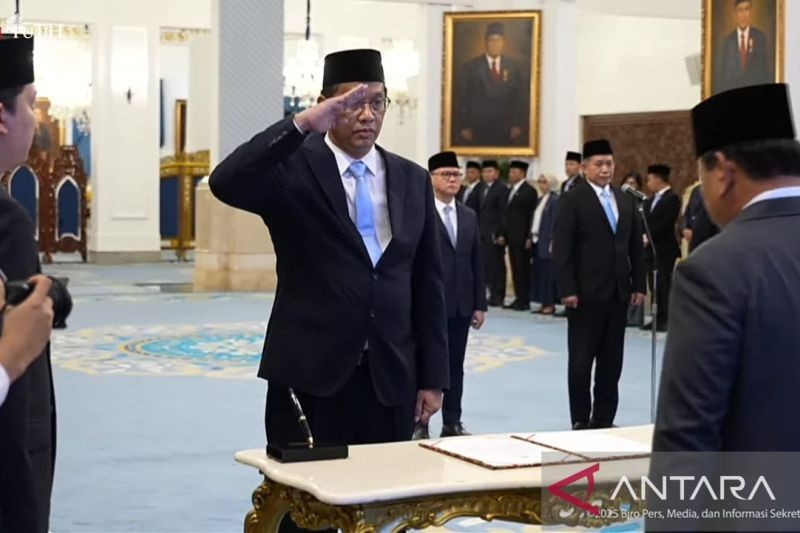News
Purbaya emerges as Prabowo's trusted hand in managing state finances
Tenggara Strategics November 4, 2025 President Prabowo Subianto (right) inaugurates Purbaya Yudhi Sadewa (center) as Finance Minister at the State Palace in Jakarta on Sept. 8, 2025. (Antara/Mentari Dwi Gayati)
President Prabowo Subianto (right) inaugurates Purbaya Yudhi Sadewa (center) as Finance Minister at the State Palace in Jakarta on Sept. 8, 2025. (Antara/Mentari Dwi Gayati)
President Prabowo Subianto appears to have found in Finance Minister Purbaya Yudhi Sadewa a trusted figure capable of managing Indonesia's state finances with both discipline and political loyalty. In just a few months on the job, Purbaya has shown a willingness to take on elite power brokers, both within the government and from circles close to former president Joko "Jokowi" Widodo, without losing sight of President Prabowo's populist agenda.
The finance minister portfolio has become increasingly strategic under the new administration. Prabowo's ambitious campaign promises, ranging from a nationwide free meal program and food estates to the construction of three million public housing units and the Red and White cooperatives, require vast fiscal space. The government must also continue funding unfinished obligations from the previous administration, including the multibillion-dollar development of the new capital city, Nusantara.
Initially, many doubted whether Prabowo, a retired general with limited experience in macroeconomic management, could steer the nation's finances. His predecessor, Sri Mulyani Indrawati, long hailed as a reformist technocrat and a respected figure at the World Bank, had often clashed with political interests while safeguarding fiscal discipline. When Prabowo took office, she retained her position as finance minister, with two deputies, one being Prabowo's nephew, Thomas Djiwandono, seen as her eventual successor.
However, the situation shifted dramatically after a wave of street protests in late August culminated in the looting of Sri Mulyani's private residence. Days later, she resigned. Prabowo moved quickly to appoint Purbaya, a seasoned economist with a reputation for quiet pragmatism, to lead the ministry. Thomas Djiwandono stayed on as deputy.
Purbaya's early moves were bold. Soon after taking office, he announced a major cut in transfers to regional governments for the 2026 fiscal year, citing inefficiencies and misuse of funds. The initial draft budget slashed transfers from Rp 919.9 trillion (US$55.7 billion) in 2025 to Rp 650 trillion. Following parliamentary discussions and directives from President Prabowo, Purbaya adjusted the figure slightly upward to Rp 693 trillion, but still the lowest since 2016.
His justification was clear, that regional governments were sitting on vast idle funds. By August 2025, unused local government deposits in banks had ballooned to Rp 233.11 trillion, the highest level since 2021. Purbaya argued that the money should be spent to stimulate local economic activities, not sleeping in the banking system.
The finance minister's tough stance triggered protests from regional leaders, including West Java Governor Dedi Mulyadi, a fellow Gerindra politician, who disputed claims that Rp 4.17 trillion of his province's funds were idle. Such tensions underline Purbaya's determination to enforce fiscal discipline, even at the cost of alienating allies within Prabowo's political camp.
Beyond the regions, Purbaya has also found himself at odds with other powerful ministers. He clashed with Energy and Mineral Resources Minister Bahlil Lahadalia, one of Jokowi's close confidants and chairman of the Golkar Party, over a proposal to double performance allowances for ministry staff, a plan Purbaya refused to endorse without the president's approval. Similarly, he has disagreed with National Economic Council chairman Luhut Binsar Pandjaitan, another Jokowi ally, over proposals to create a "family office" hub in Bali and to inject Rp 50 trillion into the Indonesia Investment Authority (INA) per annum to strengthen it.
Despite these policy skirmishes, Purbaya has taken care not to sever the continuity between Prabowo's government and Jokowi's economic legacy. His handling of the Whoosh high-speed rail project, one of Jokowi's signature infrastructure initiatives, is a case in point. Purbaya described the Jakarta–Bandung railway as "more than just a transport project" but declined to burden the state budget with its debt, instead shifting the financing responsibility to state-owned company Danantara. The move preserved fiscal prudence while signaling political respect for Jokowi's legacy.
At the same time, Purbaya has shown a populist touch consistent with Prabowo's grassroots appeal. He reassured small traders that the government would not raid markets selling imported secondhand clothing, even as customs authorities continued cracking down on illegal imports. The gesture was widely interpreted as an attempt to balance fiscal order with social empathy.
For now, Purbaya's mix of firmness and flexibility appears to be working. He has managed to assert control over the state's finances while keeping the president's political agenda intact. His readiness to confront entrenched interests, whether regional leaders, technocrats, or old Jokowi loyalists, has begun to define him as one of Prabowo's most trusted lieutenants.
But the true test will come in the months ahead, as the government tries to finance ambitious social and infrastructure programs without jeopardizing fiscal stability. In that balancing act, Purbaya's ability to maintain both economic credibility and political harmony could determine not only the success of Prabowo's presidency but also his own standing as the new power broker in Indonesia's economic policy landscape.
What we've heard
A government source familiar with Purbaya's appointment said that the former chairman of the Indonesia Deposit Insurance Corporation (LPS) was recommended by President Prabowo's inner economic circle, led by economist Burhanuddin Abdullah. "He has the president's full support," the source said, adding that Purbaya enjoys strong political backing despite his policies occasionally clashing with those of ministers affiliated with political parties.

